by Yvonne and Rachel
We’ve been covering the developing situation in Baltimore and solidarity protests elsewhere through our regular news roundups, but there’s really a lot to talk about. Here’s a complete rundown of everything we know about what’s happened as of this moment.
What Happened to Freddie Gray?
On April 12, 25-year-old Freddie Gray was arrested by Baltimore PD on the charge of carrying a switchblade, which is illegal in Baltimore, although it turns out Gray wasn’t carrying a switchblade at all. Allegedly, Gray’s arrest was precipitated by Gray running away from officers after one of them made eye contact with him.
After being handcuffed, Gray was loaded into the back of a police van, where police admit he was not seatbelted in, as is required procedure. Police say Gray was in good health when he was loaded into the van, and most narratives agree, although one video source makes it look like he may have been in pain entering the van, and another bystander also suggests Gray was injured during his arrest. Before reaching its final destination, the police van made a number of stops: the officers who arrested Gray reported they made one stop to secure Gray’s leg irons, one stop to “deal with” Gray, and one stop to pick up another prisoner. New security camera footage has since revealed a fourth stop that police didn’t mention, one which seems to have occurred at the intersection of North Fremont and Mosher and where we still don’t know what happened. When the van reached its destination, Gray had serious injuries to his spine and larynx; Gray ended up dying in the hospital as a result of these injuries on April 19.
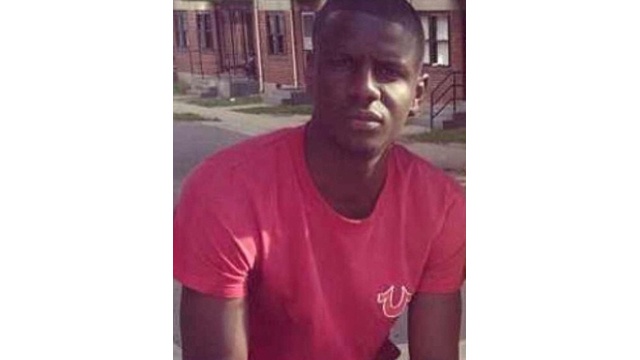
Freddie Gray
Although some sources have claimed that Gray had pre-existing spinal injuries that explain his death, this has been debunked. There are a number of possibilities: that Gray was already injured when he was put into the van, despite appearances; that Gray was intentionally injured en route, either by being beaten or being purposefully given a “rough ride;” or that the fact that Gray wasn’t seatbelted in either at the beginning of the drive nor at any of the subsequent stops caused him to be injured accidentally. The possibility has also been floated that Gray injured himself intentionally, apparently as a plot against the police, although this does not seem particularly credible; spinal injuries aren’t easy to self-inflict, and the fact that the source for this theory seems to be a document from the police themselves has some making comparisons to the 1977 death of South African anti-apartheid activist Steve Biko, whom officials erroneously claimed died of a hunger strike and not being beaten. The source cited for evidence that Gray tried to self-injure, the other prisoner picked up in the van after Gray, has since spoken publicly, saying that he was misconstrued and that he doesn’t believe the sounds he heard were of Gray hurting himself. “…They trying to make it seem like I told them that, I made it like Freddie Gray did that to hisself (sic),” Allen said. “Why the [expletive] would he do that to hisself (sic)?” Whatever the source of his injuries, the Baltimore police commissioner admitted that “We know our police employees failed to get him medical attention in a timely manner multiple times.”
As of this morning, Maryland state attorney Marilyn J. Mosby has announced that she is filing charges against all six officers involved in Gray’s arrest and death, including homicide, manslaughter and misconduct charges. In a press conference, Mosby also confirmed that the blade Gray was carrying at the time of his arrest was not a switchblade and therefore legal, making Gray’s arrest an illegal one.
In a news conference, the state’s attorney, Marilyn J. Mosby, described repeated mistreatment of Mr. Gray. She said that time and again police mistreated Mr. Gray, arresting him with no grounds, violating police procedure by putting him in cuffs and leg cuffs in the van without seat belting him and then repeatedly failing to get him medical attention. She said that when he was removed from the wagon, “Mr. Gray was no longer breathing at all.”
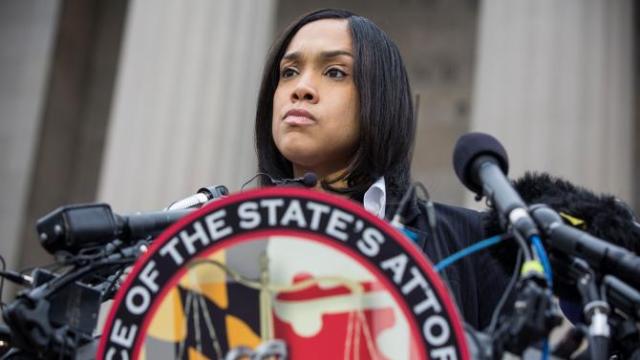
Marilyn Mosby
The Fraternal Order of Police in Baltimore has requested that Mosby recuse herself from the case and appoint a special prosecutor, because the Gray family attorney was a donor to Mosby’s campaign. In response, Mosby has pointed out that the police union also donated to candidates for the office of state attorney, raising the question of whether the FOP would also have asked them to recuse themselves had they won instead of her. The FOP also brought up Mosby’s husband’s career as a city councilman, saying “it is clear that your husband’s political future will be directly impacted, for better or worse, by the outcome of your investigation.” (For context, it is helpful to remember that Robert McCulloch, the special prosecutor in the Mike Brown grand jury case, had a police officer father who was killed in the line of duty as well as four other family members who worked for the police department; he did not have to recuse himself.)
Baltimore police have a history of beating up alleged suspects. In September, The Baltimore Sun reported the city has paid $5.7 million since 2011 over police brutality and civil rights violations lawsuits. Over the last four years, more than 100 court cases have won or reached settlements, with most of the cases reaching a limit of $200,000. The six-month investigation shows officers beat up residents during arrests resulting in broken bones, organ failure, head trauma and even death — as is the case with Freddie Gray.
“Such beatings, in which the victims are most often African-Americans, carry a hefty cost. They can poison relationships between police and the community, limiting cooperation in the fight against crime, the mayor and police officials say. They also divert money in the city budget — the $5.7 million in taxpayer funds paid out since January 2011 would cover the price of a state-of-the-art rec center or renovations at more than 30 playgrounds. And that doesn’t count the $5.8 million spent by the city on legal fees to defend these claims brought against police.”
The Baltimore Uprising
On Monday, the uprising took place near the New Shiloh Baptist Church where friends, family, activists and officials gathered to pay their last respects to Gray. The Baltimore Sun and other publications have now widely reported that students had organized “a purge” — a time period of lawlessness, an idea taken from a dystopian movie — to take place at Mondawmin Mall at 3 p.m. on Monday, which reporters say began the clash between police and teenagers. However, eyewitness teachers and parents say that wasn’t the case. They say police in riot gear were already in the area and were stopping buses and telling passengers to get off, many of which were Frederick Douglas High School students trying to get home after school.
The police had received a “credible threat” that three gangs, the Black Guerilla Family, the Bloods and the Crips entered into a partnership to “take out” police officers. They responded by preparing for the worst in the area. However, gang members have spoken out in a local news interview to explain their truce: they didn’t come together to harm police but to stand together as black men who want justice for Freddie Gray’s death.
As a result of being on high alert, the police officers stopped the nearby subway stop and blocked roads near the Mondawmin Mall and the high school, which is across the street from the mall, essentially stranding the teens trying to get home. The police didn’t allow the students to disperse so they were corralled into one area.
Meg Gibson, a Baltimore teacher described the scene: “The riot police were already at the bus stop on the other side of the mall, turning buses that transport the students away, not allowing students to board. They were waiting for the kids… Those kids were set up, they were treated like criminals before the first brick was thrown.”
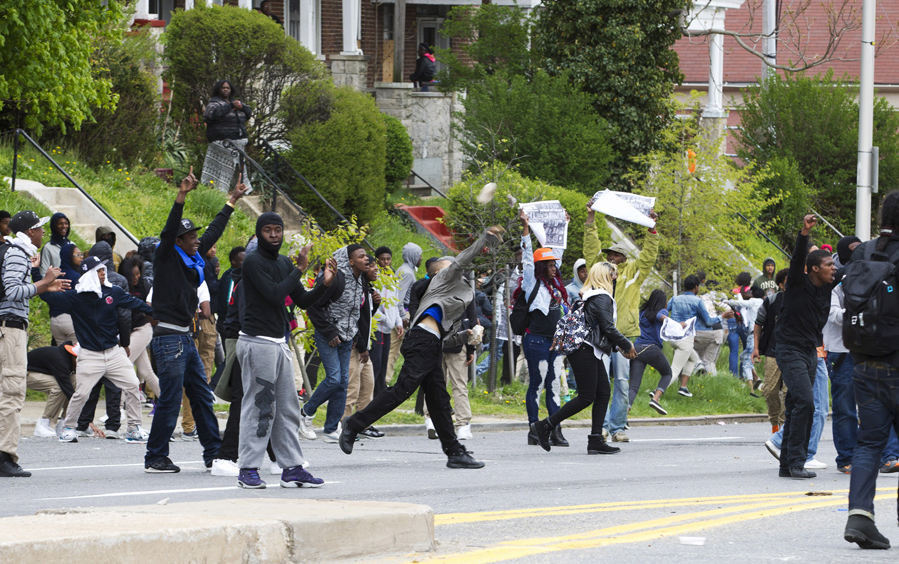
by Jose Luis Magana/AP
We don’t know for certain how the clash began but The Sun reports it “escalated quickly.” Youth threw bricks and rocks at police and the police threw them back as well as tear gas and pepper balls. Cars were lit on fire, store windows were broken and businesses were looted. At least 15 police officers were injured and over 200 arrests were made by Tuesday.
As a result of the uprising, Maryland Governor Larry Hogan declared a state of emergency in Baltimore and activated the National Guard on Monday evening, Baltimore Mayor Stephanie Rawlings-Blake instituted a week-long city curfew from 10 p.m. to 5 a.m. (that’s still in effect) and Baltimore City public schools canceled classes on Tuesday.
Half of those arrested were released a couple of days later, after being held double the time that they should’ve been held without due process. Police arrested people for no apparent reason during Monday’s uprising and failed to write a report so these folks were held illegally for two days. Marci Tarrant Johnson, a volunteer “public defender for peace, police accountability and probable cause,” wrote a Facebook status about the deplorable conditions the arrested faced. She writes that many of the women she interviewed weren’t allowed to reach family members, as many as 15 women were put in one holding cell for a couple days without any clean water in the cell, and they were only given white bread and cheese to eat.
Monday’s uprising followed near-daily peaceful protests until last Saturday, on April 25, when some demonstrators smashed police car windows and store fronts near Camden Yards, the baseball park. Protesters say baseball fans and bystanders agitated them by hurling racial slurs at them, which resulted in the disruptions. 12 people were arrested.
Since Baltimore’s uprising on Monday, protests have sparked nationwide in solidarity with Baltimore and to protest Freddie Gray’s death at the hands of police. On Wednesday, thousands of protesters gathered at Union Square in New York where they chanted “Black Lives Matter” and “I Can’t Breathe,” the last words of Eric Garner, the Staten Island black man who died in an illegal police chokehold last year. Millions March NYC organized the demonstration. “While much attention has been given to the protests and rallies in Baltimore over the last few days, less time has been spent talking about the egregious cause of this community’s justified anger,” Millions March said in a statement. “Their protests join a national movement for black life in the face of police murders across the country.” More than 100 people were arrested in New York. Smaller demonstrations were held in Boston, Denver, Houston, Indianapolis, Minneapolis, Washington and Ferguson, Missouri.
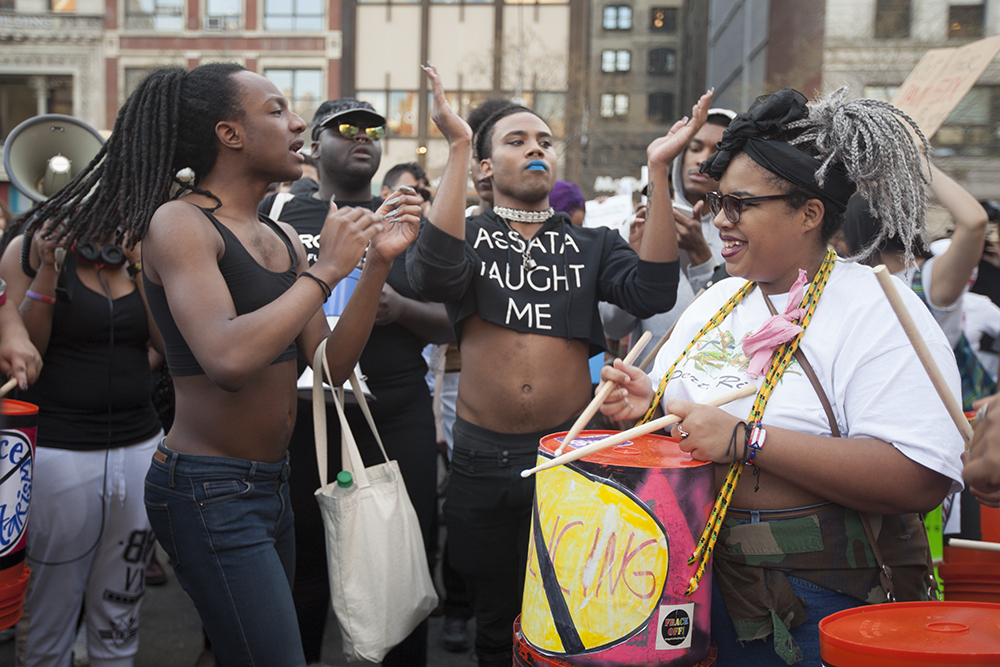
NYC March By Tiara Chiaramonte/ Huffington Post
On Thursday, several hundred protesters gathered in front of Philadelphia’s city hall in the afternoon. Later in the evening, protesters tried to block the entrance to I-95 and clashed with police. Two were arrested.
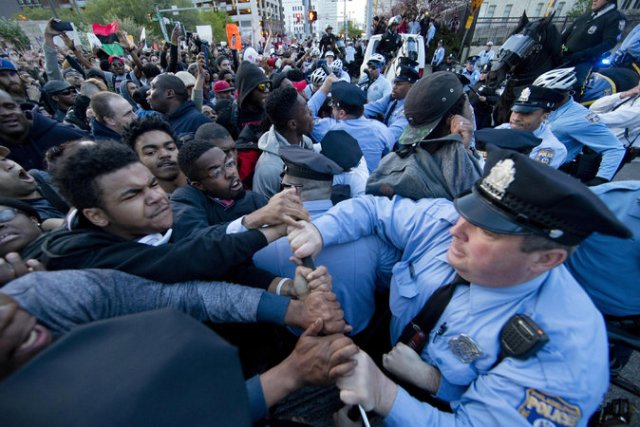
At the Philly march by Matt Rourke
How to Help
+ Give at the Operation Help or Hush donate page to contribute to #BaltimoreLunch and help the people and the kids of Baltimore eat. Many students in Baltimore depend on school lunches to stay well fed, so when Baltimore’s schools closed, they didn’t have access to them. Operation Help or Hush stepped in to help, and even now that schools are open again they continue to provide support in Baltimore.
https://twitter.com/akacharleswade/status/593794531331547136
+ You can also help a Baltimore resident pay their water bill; the city has been sending water shutoff notices to 25,000 customers behind on their bill.
+ Donate to Baltimore protesters’ bail and legal support fund here.
+ One list of nationwide protests in solidarity; feel free to share more! And here’s a list of things that Baltimore Uprising thinks should be in your protester action kit.
+ If you attend a protest in the future, here’s a strategy to consider or to discuss with organizers leading the protests. Son of a Baldwin shared what they learned at the Brooklyn Movement Center. Activists shared their very similar experiences while protesting: the police usually target black participants during protests. A strategy to combat this and to protect black protesters was to arrange the protest participants in layers according to their color privileges: white people outlining the group, then Asians, then Latinos, then Native Americans, then any other non-black people of color and then finally black people in the middle of the group.
+ There are always other ways you can contribute to ending police violence and fighting institutionalized racism other than protesting or rallying in the streets. Tikkun Daily, a blog for people interested in “a spiritual progressive perspective on politics, art, religion, and activism,” compiled some suggestions for you called “26 ways to be in the struggle beyond the streets.”
+ If you are a white person trying to figure out what your role is in this movement, you should check out SONG’s (Southerners On New Ground) document on this very topic. They invite you to wrestle with these ideas, thoughts and questions:
- What does white leadership look like in this time? As white people in the movement for Liberation, what is our role in this time (not for all time)? How does our feminist, propoor, pro-Black, pro the oppressed, pro-queer and trans politic inform not just what we think or say, but what we do?
- What is the greater organizing and work needed in this time from white people, so that we can move beyond just safety and survival and into leadership in the struggle for Black lives, immigrant lives, and trans women of color lives?
- What are the key fights in our time that we white people can engage to advance broad movement goals that confront and dismantle white supremacy and structural oppression?
+ Here’s a tip from a Baltimorean: “There are grassroots activism/organizations in Baltimore that have been working on the issues of poverty, racism, inequality, etc in the city long before the protests started. Consider donating to one of those locally grown organizations.” Here’s a list of organizations.



are the links working for y’all? I’m getting a lot of “Page not found” but maybe that’s me.
This is such a good article and summary, thank you! I’m looking forward to hearing from the QPOC Speakeasy.
sorry about the links! we’re working to get them fixed asap!
ok i think all the links are working now. let me know if they’re not!
Thank you so much for writing this. I really appreciate that Autostraddle addresses these topics. This is the most comprehensive overview I’ve come across and really helps paint a complete picture. The last part with what I can do was especially important and helpful. I’ve got a lot of reading to do!
Like Claire7 I had some problems with the links, particularly the last few, going to page not found.
My thoughts exactly, I love that y’all cover a range of topics and help out those who might not have an idea (for whatever reason) of what’s going on.
Thank you for covering my city, Autostraddle. This is a great roundup of what’s been going on. <3
Another way to help: There are grassroots activism/organizations in Baltimore that have been working on the issues of poverty, racism, inequality, etc in the city long before the protests started. Consider donating to one of those locally grown organizations. A list has been started here: tinyurl.com/baltimoreorgs
wow this is a great resource! thanks for sharing, anna!
Thank you for all these resources.
Thank you AS, for giving good coverage and ways to help in a format I’m happy to share with folks.
I really appreciate the round up, i think I’m the same as others with getting bits and pieces of information all over the place. I watched the FOP respond to the charges and the lawyer said “the officers did nothing wrong” and a black police officer stated, “there is no animosity between the police and the baltimore community.” seriously dude?! a kid who had “no reason” to fear the police took off running when he came across them and now he’s dead.If Freddie Gray had a record you know damn well that we would have heard about it by now as an “excuse” for the violence he suffered through.
Lastly, I read a long form piece posted by Reise and I think it was about police brutality in Arizona? and the prosecutor pressed charges against officers who killed a citizen then the police retaliated against the prosecutor and the office. I hope that doesn’t happen in baltimore.I hope the AG is really serious about this.
Thank you for this. Very important roundup.
This is excellent; thank you so much!
I saw the police union had set up a GoFundMe for people to donate money to help the police officers during the riots and was about to get mad when I saw that the GoFundMe had already been suspended and removed from the website…and it felt pretty good.
I’m really proud of how Mosby is stepping up to deal with this justly, unlike most other officials in towns where racially motivated police shootings occurred (cough cough Ferguson) but I’m even more proud of the protestors out there continuing to fight right now. But nothing will ever bring Freddie Gray back unfortunately
What about the people just burning a building down, and cutting the fire-hoses the firefighters were using?
As a member of the LGBT community and as a Police Officer, I have a few things to say. First I’m glad Mosby is the Prosecutor in this case, she comes from a long line of Law Enforcement and she gets how much it takes to go out and try to do the best you can for your community. Mosby understands the difference between a good and a bad Cop. I also want it out there that I believe what happened to Freddie Gray was wrong and I believe justice will be served.
I want anyone reading this to understand how hard it can be to be a Police Officer. I’m not asking for sympathy, I signed up fo this career, but there are things I see on a daily basis that I wouldn’t wish on my worst enemy. I say this because I want people to remember that not all Police Officers are bad. Not all of us make these kind of astronomically bad decisions, despite what some media sources would have people believing.
When the riots started, the Baltimore PD stood there for a long time having rocks thrown at them. I get that some people feel Police have less of a right to protect themselves than the normal person. My question is why? How long could anyone reading this have rocks thrown at them before they threw them back? I have two goals when I go to work, help at least one person that day and go home that night. My wife and I have a plan in place should I be killed in the line of duty (it’s not a fun conversation to have). These are the realities of being a Police Officer.
One of the comments was that a black Baltimore PD Officer felt there was a good relationship between the Baltimore community and the Police. Maybe from his perspective it is. As Police Officers we have a “beat” or area we are assigned to patrol. Perhaps on his beat he does have a good relationship with the community. I know I do on mine. I know several people on my beat by first and last name and its not because I’ve arrested them. It’s because I want to build a good relationship to the community so they feel they can trust me. Not every person in Baltimore hates the Police. The peaceful protestors standing in front of the police lines to protect the Officers from the violent protestors proves this point.
Again what happened to Freddie was wrong, just try and remember that there are good Police Officers out there.
I agree 100%. I’m in the Army and people are lumping together the entire Army like it’s not our duty to obey orders. I feel like if more officers were as brave as you to speak up and call out wrong then it would be better. When some ppl try and justify the actions of bad cops it’s really unfair to the honest hardworking officers who sacrifice a lot to do their jobs.
when a man kills his wife, are we supposed to remember that not all men are killers? is that the most important thing?
not all cops are bad is the same as not all men are rapists is the same as not all white people are racists and it’s the same rhetoric that doesn’t highlight real problems.
i understand that you have a personal connection to this but why is it so hard to acknowledge the savage acts and deplorable brutality that police officers have committed? why must the response be “but some of us are so nice!” why does that have to always come first?
why not be the person who encourages other cops to be better and not kill people? or at the very least rally for better training on deescalation tactics for police officers? like if that’s your focus – the cops- and not the person murdered and their grieving community, then why not try to push to be better, much much better?
why not fight for a system that doesn’t set cops against citizens and instead utilizes both groups for the betterment of the community?
Mosby is on it and she’s got cops in her family. I’m just saying…